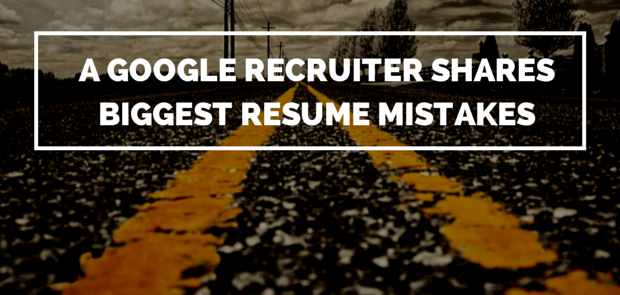
Laszlo Bock is the SVP of People Operations at Google. He originally shared this insight on Linkedin.
Resume mistakes are easy to make. After all there is not standard or a written guide on how various companies like their resume formats as. But a top Google recruiter shares some of the biggest resume mistakes he sees.
Mistake 1: Typos
Typos are one of the top resume mistakes. It’s widely accepted and in the UK even on graduate application forms there is a 3 strike rule. Make three typos in a 9 page application and your application is rejected.
Laszlo Bock writes “People who tweak their resumes the most carefully can be especially vulnerable to this kind of error, because they often result from going back again and again to fine tune their resumes just one last time. And in doing so, a subject and verb suddenly don’t match up, or a period is left in the wrong place, or a set of dates gets knocked out of alignment. I see this in MBA resumes all the time. Typos are deadly because employers interpret them as a lack of detail-orientation, as a failure to care about quality. The fix?
Read your resume from bottom to top: reversing the normal order helps you focus on each line in isolation. Or have someone else proofread closely for you.”
A 2013 CareerBuilder survey found that 58% of resumes have typos. Source.
Mistake 2: Length
If you are a student looking for your first job out of uni, stick to 2 pages at max. Stop making another of the obvious resume mistakes by boring the recruiter with your whole life story. Stick to points relevant to the job. Recruiters skim your resume in 6 seconds – make it worth it.
Laszlo Bock writes “A good rule of thumb is one page of resume for every ten years of work experience. Hard to fit it all in, right? But a three or four or ten page resume simply won’t get read closely. As Blaise Pascal wrote, “I would have written you a shorter letter, but I did not have the time.” A crisp, focused resume demonstrates an ability to synthesize, prioritize, and convey the most important information about you. Think about it this way: the *sole* purpose of a resume is to get you an interview. That’s it. It’s not to convince a hiring manager to say “yes” to you (that’s what the interview is for).”
Mistake 3: Formatting
There are creative resumes and then there are uncreative people attempting to catch the recruiter’s attention by trying to be creative on their resumes. Colouring your resume pink or adding bob the builder to your resume as you are looking for a civil engineering job, has to be a fail. Avoid adding lines and tables to your resume as that is unnecessary formatting.
Laszlo Bock writes “Unless you’re applying for a job such as a designer or artist, your focus should be on making your resume clean and legible. At least ten point font. At least half-inch margins. White paper, black ink. Consistent spacing between lines, columns aligned, your name and contact information on every page.”
p.s. avoid these resume mistakes I made.
Mistake 4: Confidential information
This is important and very easy mistake to make on your resume. Avoid showboating my mentioning your clients or company information. What happens if you are going for an interview to be a CEO? Well in that case you are reading the wrong blog, I don’t write for CEO’s …
Laszlo Bock writes “In a very rough audit, we found that at least 5-10% of resumes reveal confidential information. Which tells me, as an employer, that I should never hire those candidates … unless I want my own trade secrets emailed to my competitors.
The New York Times test is helpful here: if you wouldn’t want to see it on the home page of the NYT with your name attached (or if your boss wouldn’t!), don’t put it on your resume.”
Mistake 5: Lies
Never lie on your resume. The rest of the 4 mentioned resume mistakes are instant failures, you will get rejected and you can sort it out. When you lie on your resume, you can get away once but you have to live with it and never know when it gets found out. Here’s a good article Asya Bodeva wrote on lying on a resume. She spoke to a few people and the conclusion was scary.
Laszlo Bock writes “Putting a lie on your resume is never, ever, ever, worth it. Everyone, up to and including CEOs, gets fired for this. People lie about their degrees (three credits shy of a college degree is not a degree), GPAs (I’ve seen hundreds of people “accidentally” round their GPAs up, but never have I seen one accidentally rounded down — never)”
There are three big problems with lying:
- You can easily get busted. The Internet, reference checks, and people who worked at your company in the past can all reveal your fraud.
- Lies follow you forever. Fib on your resume and 15 years later get a big promotion and are discovered? Fired. And try explaining that in your next interview.
- Our Moms taught us better. Seriously.
Laszlo Bock is the SVP of People Operations at Google. He originally shared this insight on Linkedin. Read his full post.

